Resume: NABJ, Ebony, CNN, Academia, Knight Ridder
Susan Smith Richardson Joins Guardian U.S.
Homepage drawing credit: Indian Express
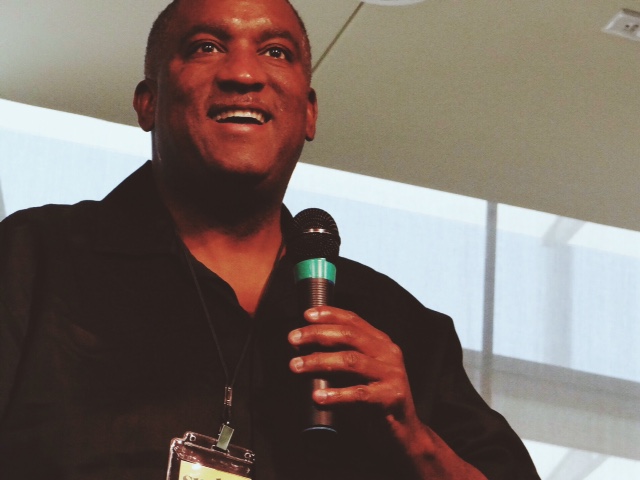
Resume: NABJ, Ebony, CNN, Academia, Knight Ridder
Bryan Monroe, a journalism professor and former president of the National Association of Black Journalists who shared in a Pulitzer Prize, died Wednesday at his suburban Washington home after a heart attack, David Boardman, dean of the Lew Klein College of Media and Communication at Temple University, announced on Facebook. He was 55.
“Personally, I am in shock at this news,” Boardman wrote. “Helping bring Bryan to Temple was a point of great joy and pride for me, and he absolutely loved our college, our university, our students and his Klein colleagues. He was a wonderful and loyal friend, a loving father, a gifted journalist and a caring, dedicated teacher. . . .
“I have known Bryan for more than 30 years, from when I was a young reporter and editor at The Seattle Times and he was a photography intern.
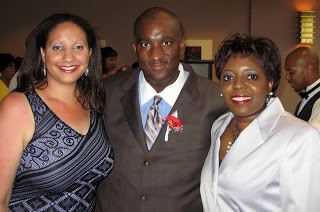
“He went on to a stellar career as a journalist, including serving as assistant vice president of news at Knight Ridder Newspapers, where he helped lead journalists at the Biloxi Sun Herald to the 2006 Pulitzer Prize Gold Medal for Public Service for their coverage of Hurricane Katrina. He also was editor of Ebony and Jet magazines, and in that role had the distinction of being the first person to interview Barack Obama when he became president and the last to interview Michael Jackson before he died – a fact he loved sharing with students the first day of each semester.
“He went on to become editor of CNNPolitics.com and served as a visiting professor at Northwestern University’s Medill School of Journalism before joining us here at the Klein College of Media and Communication at Temple University.”
Boardman called Monroe a passionate advocate for coverage of underrepresented communities and for the elevation of journalists of color.
“In fact, for the past two months, he has been co-leading a Klein College task force performing a content and culture audit for The Philadelphia Inquirer,” Boardman wrote.
Reginald Stuart worked with Monroe at Knight Ridder, where he was assistant vice president/news from 2002 to 2006.
“Bryan was a genuine journalist from A to Z. It was fun working with him in newsrooms on the go, at recruiting events, helping restore newsroom and communities damaged in hurricane storms and having nice dinners. He shared his knowledge and skills, treasured ethics, sincerity and collegiality. Bryan was a good guy,” Stuart, journalist and corporate recruiter for Knight Ridder, messaged Journal-isms.
Monroe’s tenure as 2005-2007 NABJ president was marked by the ouster of then-popular shock jock Don Imus, who sparked outrage when he characterized the Rutgers University women’s basketball team as “Nappy headed ho’s.” Monroe was credited with being the first national voice to call for Imus’ firing, and he helped organize a successful effort to have him gone.
“For me, Imus represented much of what was wrong with the media,” Monroe wrote when Imus died in 2019. “He routinely belittled women, insulted Blacks and put down just about anyone he wanted to.
“But he also was at the center of a moment in history that ultimately showed what is right with the media — how men and women of integrity can come together to shut down ugliness, racism and hateful speech. And for that, I am proud of my association with Don Imus.
“It was the week before Easter, in April 2007. I was in Chicago, closing out the cover of the June issue of Ebony magazine, where I was Editorial Director and Editor-in-Chief. I was also the President of the National Association of Black Journalists (NABJ) at the time. Those two aspects of my life would slam against each other over the next week, a week that would change my life and the lives of hundreds across the country. And for one man, radio shock jock Don Imus, life would never be the same . . . .”
John Yearwood, a board member of the International Press Institute who was treasurer of the NABJ board that Monroe led, messaged Journal-isms that “he had a big and important international footprint as NABJ president. He was the first, and I believe only, NABJ president to speak from the podium in the United Nations General Assembly Hall.
“He was incredibly proud of that moment. He also led an NABJ delegation to Tanzania to report on advances in malaria eradication after a young member died of the disease at our convention in Atlanta. He worked closely with Djibril Diallo, then of the U.N., on many of these opportunities. Global journalism has lost a true champion.
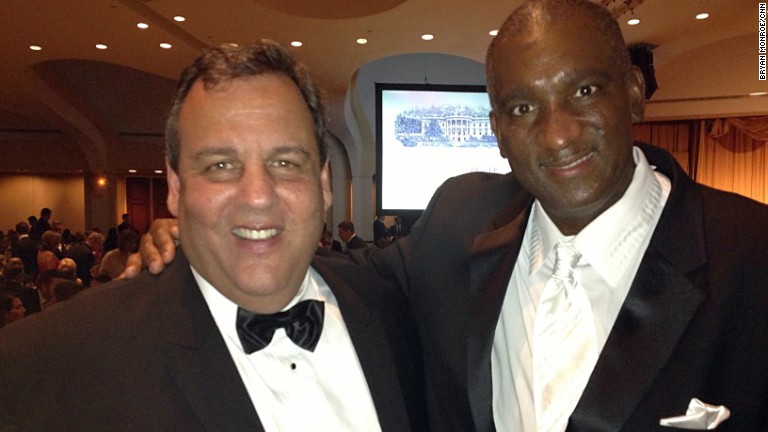
Monroe also dealt successfully with a personal issue — his weight. He lost more than 170 pounds in 2006 after having gastric bypass surgery, and in 2013, joined others formerly overweight in openly congratulating then-New Jersey Gov. Chris Christie for undergoing Lap-Band stomach surgery.
There “will be those who said you did all this just because you want to be president in 2016,” Monroe wrote for CNN. “A fat president wasn’t even a good look for William Howard Taft back in 1909.
“Some or all that may be true, but really, governor, we know there’s a lot more to the story.
“You did this to live.
“You did this because 50 is just too young to drop dead of a heart attack, diabetes or a stroke.
“You did this for your health. Not to mention that it would be kind of sad to get out-hustled in Iowa or New Hampshire or Florida by Hillary Clinton simply because you needed to stop and catch your breath on the campaign bus.”

In Biloxi, Miss., in 2005, where Monroe helped supervise coverage, for which he shared in a Pulitzer prize.
As NABJ president, Monroe also helped inspire a coalition of news organizations to take up the investigative work pursued by Chauncey Bailey, a Black journalist who was shot and killed in 2007 as he was walking the last few blocks to his job as editor of the Oakland Post, a weekly paper serving the Bay Area’s African American community. The coalition became known as the Chauncey Bailey Project.
Folio: the magazine about magazines, said this in 2008 about Monroe’s tenure at Ebony/Jet, a time that became controversial as Monroe hired several journalists away from the mainstream media, and in the process alienated some existing employees. Some took buyouts.
“As vice president and editorial director of Ebony and Jet, Monroe says he took this as an opportunity to lift the level of conversation to focus on the larger issue — the culture of disrespect. Forty pages of Ebony’s July issue last year were devoted to an honest examination of race and the destructive or constructive effect of language on black culture, he says. The cover consisted of white type — with the words ‘Who You Callin’ A…’— on a black background, without the usual celebrity.
“Monroe then followed up on these concerns a few months later when he declared in his editor’s letter that the ‘N’ word would not be used in Ebony or Jet unless it was absolutely critical to the story and only if he signed off on it. This letter ran in the same issue that presidential candidate and Senator Barack Obama appeared on the cover with his wife Michelle.
Ebony published a lavish issue on the 25th anniversary of Jackson’s “Thriller,” and featured eight different covers for its August 2008 issue: “The 25 Coolest Brothers of All Time.” Partly because of publisher Linda Johnson Rice’s ties to fellow Chicagoan Obama, Ebony scored the first postelection interview with the president-elect, though it was not published until Obama had granted other interviews.
Others remember Monroe for his personal qualities. “I have fond memories of Bryan in one particular situation,” the late diversity advocate Walt Swanston once told Journal-isms. “I don’t remember the year, but when one of the young women participating in the student project died during the convention, Bob Butler and I went to Bryan to see if NABJ could help bury her. Bryan took the lead and we helped [raise] enough money during the Sunday brunch to help pay for a funeral. So, I am a fan….”
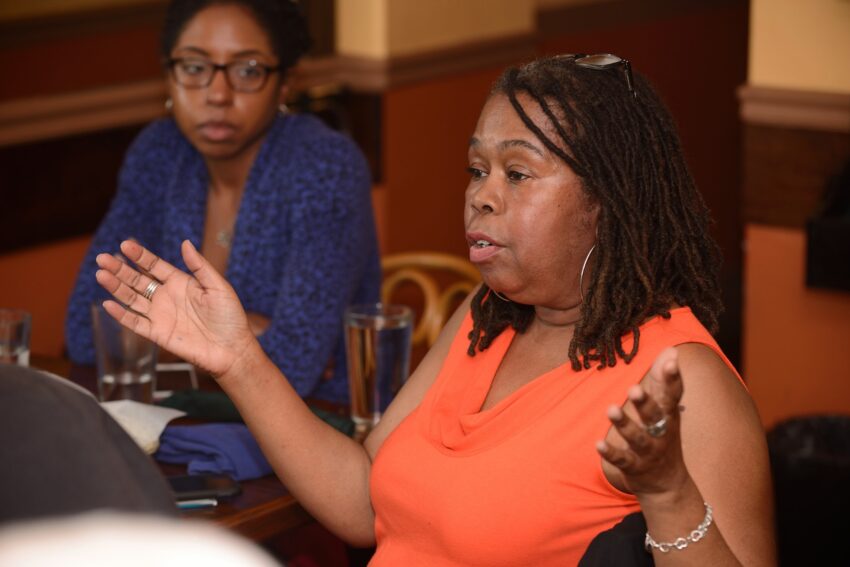
Susan Smith Richardson with April Simpson, left, at a Journal-isms Roundtable in 2019 (Credit: Bonita Bing/Tolbert and Bing Studios)
Susan Smith Richardson Joins Guardian U.S.
Susan Smith Richardson, named chief executive officer of the nonprofit investigative Center for Public Integrity less than two years ago, Wednesday was named a deputy editor of the Guardian US.
“This new senior leadership position will help build on the success of Guardian US journalism alongside two existing deputy editors,” the British-based Guardian announced.
“Over the last six months Guardian US has instituted ongoing initiatives across the company to address diversity, equity and inclusion (DEI). Richardson will help drive, refine and advance those initiatives in the newsroom and will help develop coverage on race and identity, power and inequality. She will also build newsroom practices that enhance DEI in sourcing, commissioning, editing, audience, recruitment and retention.
“Richardson will drive partnerships with other regional and nonprofit newsrooms, and will help expand the diversity of voices, ideas and people Guardian US covers, and who contribute to Guardian US. She will also have a role in helping to develop philanthropic projects centered on racial justice and inequality.
“Richardson is an award-winning editor with more than three decades of experience in news media. She brings deep expertise in social justice and inequality, as well as nonprofit newsrooms.”
Before the Center for Public Integrity, Richardson “was the editorial director of Newsroom Practice Change at Solutions Journalism Network, a nonprofit focused on civic engagement and strengthening democracy.
“When she was editor and publisher at non-profit news outlet The Chicago Reporter, she drove coverage on race, poverty and income inequality, which was cited by the U.S. Department of Justice as an important public service. Previous positions also include managing editor at the Texas Observer, and editor at the Chicago Tribune and the Sacramento Bee. . . .”
Richardson is also a member of the new Journal-isms Inc. board of directors.
- Elliot C. Williams, DCist: [In Washington,] Kojo Nnamdi Show To End Production This Spring After 23 Years On Air
News Guild Links Capitol Siege With Media Literacy, Newsroom Cuts and Racism
Updated January 11:
Sam Fulwood to Lead American U. J-School
Manny Garcia to Edit Austin American-Statesman
Shawna Thomas Named EP of ‘CBS This Morning’
Jon Funabiki Retires From Renaissance Journalism Project (Short Takes)
New roles for Abby Phillip and Jim Acosta at CNN (Short Takes)
Jan. 10:
News Guild Links Capitol Siege With Media Literacy, Newsroom Cuts and Racism:
‘Murder the Media’ Scrawl, Confederate Flag Cited
‘Dragged Backward into the Trumpist Mob’
Biden, Michelle Obama Agree on Police Double Standard
Toledo Byline Strike Protests Pro-Trump Spin
Africans Have Fun at Americans’ Expense
Important Threat to Civil Rights Overlooked?
Ray Rivera Named Top Editor at Oklahoman
Albor Ruiz, Cuban-American Columnist, Dies at 80
Advertisers Boost Spending on Black Media
3 Magazines Aimed at People of Color Launched
Should Washington Post Join in Mea Culpas?
Ireland to Apologize for Deadly Orphanages
Short Takes
Support Journal-isms
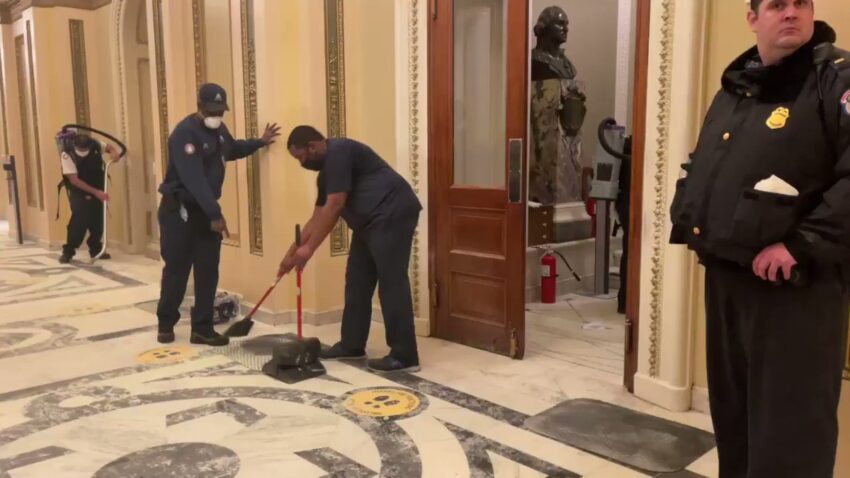
Friday’s edition of the Metro Washington Council News, AFL-CIO, published this photo with a quote from M. Kei, editor of Atlas Poetica: A Journal of World Tanka, “Black janitors cleaning up after white insurrectionists is a summary of US history.”
‘Murder the Media’ Scrawl, Confederate Flag Cited
 Leaders of the national union for print journalists say they see a direct link between the mob takeover of the U.S. Capitol and white supremacy, the gutting of newsrooms and the need for media literacy.
Leaders of the national union for print journalists say they see a direct link between the mob takeover of the U.S. Capitol and white supremacy, the gutting of newsrooms and the need for media literacy.
Jon Schleuss (pictured), president of the News Guild-CWA, declared in a statement Thursday, “Media literacy should be required in schools: Yesterday’s mob acted on lies spread by politicians and operatives intent on spreading misinformation.
“It’s clear that our needs to prioritize media literacy in our education system. Too many people accept lies and conspiracy theories as fact. Media literacy education would provide our children with the skills necessary to understand the intent behind messages: understanding bias, determining fact from fiction and looking for alternative sources of information. Media literacy is essential if we intend to confront extremism, radicalization and racism in our country.”
The decision Friday by Twitter to pull President Trump’s account was the result of Trump’s incitement of violence, but was also an acknowledgement of the deadly consequences of misinformation.
The “stakes of the rampant lies and misinformation on social media platforms were underscored by a rising body count as Trump and others denied the severity of the [coronavirus] pandemic,” Nitasha Tiku, Tony Romm and Craig Timberg wrote Friday in the Washington Post. “Facebook, Twitter, YouTube and others all took action against viral falsehoods that were clearly contrary to science. Not long after, they dramatically stiffened policies against conspiracy theories, such as QAnon, and the rise of dangerous armed groups, such as the boogaloo, born of largely unrestricted online worlds.”
But technology is only one element of the equation, media literacy advocates have determined. “Making people aware of how information is circulated, and how news is shaped and promoted, will give people the knowledge to make their own informed decisions,” British academicians Philip Seargeant and Caroline Tagg wrote in 2018 in connection with UNESCO’s Global Media and Information Literacy Week.

A member of the Capitol Hill mob scrawled “Murder the Media” (Credit: Twitter)
On Twitter, writer Farai Chideya suggested it is not just media literacy that journalists need to elevate. “I’ve tried over and over to cover white nationalism in big newsrooms where I worked,”she tweeted. I only managed to do it successfully as a freelancer, or in self-financed work, or on my blogs. My experiences are a microcosm of why so much media seems shocked. Our profession failed our duty.”
Schleuss, whose News Guild claims 24,000 members, also wrote, “The chaos and discord we are seeing is in part due to the erosion of local news across our nation. There are more than 40,000 fewer journalists working in America today than there were a decade ago, which has left a vacuum that increasingly is filled with conspiracy theories and partisan propaganda.
“The pandemic has sped up the loss of journalists across our country, with more than 11,000 journalists losing their jobs just in the first half of 2020. Greedy corporations, media consolidation and the gutting of newsrooms by financial players has robbed us of local truth tellers. Our founding fathers prioritized the free flow of information so voters would be informed participants in democracy. Hedge funds and greedy private equity have been robbing us of our democracy. They need to be rooted out of our industry and we must invest in more local news jobs: through the work of local do-gooders, foundations and public support. As it did in the founding days of our nation, public policy must support a free and robust press.”
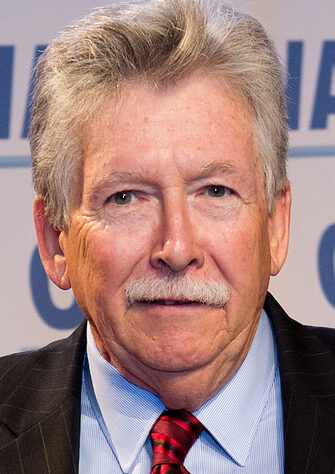 The “CWA” in “News Guild-CWA” stands for Communications Workers of America. In a separate message Thursday, Chris Shelton, the CWA president (pictured), bore down on the role of white supremacy.
The “CWA” in “News Guild-CWA” stands for Communications Workers of America. In a separate message Thursday, Chris Shelton, the CWA president (pictured), bore down on the role of white supremacy.
Shelton’s statement was headlined, “Yesterday’s Insurrection Was An Attack on Democracy by White Supremacists and Fascists.” Shelton said of the mob, “Two images from their failed attempt to violently invalidate the votes of millions of Americans make their motives absolutely clear: the sight of the confederate flag being paraded through the halls of the Senate and a message scrawled on a door, ‘Murder the media.’
“White supremacy is a poison that has been with us since the beginning of our country, and the confederate flag is its symbol, meant to subjugate and terrorize Black, brown, Asian and Pacific Islander, and Indigenous people. That was the goal of this mob and the President who asked them to assemble on his behalf.”
Shelton cautioned, “The end of Trump’s presidency does not mean an end to white supremacy in our government. . . .
“Far too many politicians enabled Donald Trump to build and sustain power. Corporate CEOs and board members, driven only by the size of their fortunes, continue to extract wealth from our labor and cynically exploit racism for their own gain.
“Along with the free press, free, democratic labor unions like ours are targets of fascists who fear the power of workers united in common cause. We must remain committed to the fight to strengthen our democracy and resist white supremacy and fascism. We must continue the process we began last spring to deepen our efforts to dismantle racism, including racism within our union. . . . “
Shelton did not identify which corporate CEOs and board members “cynically exploit racism for their own gain,” and his spokespersons were unavailable.
- Bill Carter, CNN: Business leaders like Zuckerberg, Dorsey and Murdoch should be ashamed for enabling Trump
- Marc-André Argentino, The Conversation: QAnon and the Storm of the US Capitol: The Offline Effect of Online Conspiracy Theories
- Mike Blinder, Editor & Publisher: “Enough is Enough” (A Publisher’s Opinion)
-
Committee to Protect Journalists: CPJ calls for accountability for attacks on media during US Capitol assault
- Michael Kunzelman and Amanda Seitz, Associated Press: Experts: Capitol riot product of years of hateful rhetoric
- National Association of Black Journalists: NABJ Condemns Shameful Violence, Terrorism at U.S. Capitol, Calls for Protection of Journalists
- National Association of Hispanic Journalists: NAHJ condemns violence at the U.S. Capitol, calls for increased press protections
- Gene Policinski, Freedom Forum: Capitol Rioters Trampled on First Amendment Freedoms
- Dan Shelley, Radio Television Digital News Association: RTDNA statement on events of January 6, 2021
- Craig Silverman, BuzzFeed: A Facial Recognition Company Says That Viral Washington Times “Antifa” Story Is False
- Dorothy Tucker, National Association of Black Journalists: NABJ Issues Security Advisory for Journalists in Wake of Capitol Insurrection
- Dorothy Tucker, National Association of Black Journalists: Insurrectionists Who Attacked Media Must Be Held Accountable

An angry male rioter shouted, ‘Why are the media here!?’ Another man could be heard screaming, ‘We’re coming for you!’ (Credit: Julio Cortez)
‘Dragged Backward into the Trumpist Mob’
“Associated Press photographers Julio Cortez and John Minchillo were both in Washington, D.C. on Wednesday doing their jobs — documenting the unprecedented storming of the U.S. Capitol by a pro-Trump mob,” Jamie Ross reported Friday for the Daily Beast. “But, as Cortez’s terrifying GoPro footage shows, the rioters did not want them anywhere near them to record their illegal and destructive actions.
“Cortez’s video begins as he and Minchillo are apparently taking photos of police officers in riot gear outside the Capitol before their defenses were breached and the storming of the building began. Cortez suddenly swings around to show Minchillo being dragged backward into the Trumpist mob as an angry male rioter shouts out: ‘Why are the media here!?’ Another man can be heard screaming ‘We’re coming for you!’
“Minchillo then disappears from sight and Cortez dives into the baying crowd to go after him as everything is recorded on his GoPro. Cortez finds Minchillo being pushed around by angry white men and pleading with them to leave him alone, apparently pointing to his press lanyard. One of the rioters can be heard shouting: ‘Get the fuck out of here!’
“Minchillo is then dragged and pushed over a wall, and drops hard to the ground below, taking a protester with him. He’s then angrily questioned as to whether he’s ‘antifa’ as one man wearing a MAGA hat retrieves his camera and tells the people surrounding them that Minchillo is with the press. Two protesters then help him get out of the crowd. . . .”
- Tiffany Hsu and Katie Robertson, New York Times: Covering Pro-Trump Mobs, the News Media Became a Target
- Sarah Rumpf, Mediaite: Kelly Loeffler Aide Reportedly Shoves CNN’s Manu Raju, Gets Reprimanded By Capitol Police
- Craig Silverman, BuzzFeed News: A Facial Recognition Company Says That Viral Washington Times “Antifa” Story Is False
Biden, Michelle Obama Agree on Double Standard
The first words from many African Americans, including Black journalists, during Wednesday’s Capitol riot were that had it been a Black Lives Matter protest, the reaction from law enforcement would have been more forceful, even bloody. On Thursday, President-elect Joe Biden, along with many other whites, agreed. So did former first lady Michelle Obama.
Biden “denounced what he described as an unequal justice system reflected in the lenient response to the mostly White rioters who assaulted the U.S. Capitol on Wednesday, suggesting a stark contrast with the treatment of racial justice demonstrators across the country last summer,” Annie Linskey, Chelsea Janes and Amy B Wang wrote Thursday for The Washington Post.
“ ‘You can’t tell me that if it had been a group of Black Lives Matter protesters yesterday they wouldn’t have been treated very differently than the mob of thugs that stormed the Capitol,’ Biden said in Wilmington, before beginning to hammer his fist against the lectern. “We all know that is true. And it is totally unacceptable. Totally unacceptable. The American people saw it in plain view.”
Obama took to Twitter. “And for those who call others unpatriotic for simply taking a knee in silent protest, for those who wonder why we need to be reminded that Black Lives Matter at all, yesterday made it painfully clear that certain Americans are, in fact, allowed to denigrate the flag and symbols of our nation,” Obama added. “They’ve just got to look the right way. What do all those folks have to say now?”
The Capitol Police chief resigned.
Steven Sund, “who took over the 2,000-member Capitol Police force two years ago and whose biography lists him as an expert in ‘critical incident management,’ handed in his resignation on Thursday after pressure from congressional leaders. The sergeants-at-arms of the House and Senate resigned, too,” The New York Times reported.
NBC News anchor Lester Holt called Wednesday’s events “unAmerican” and “cruel.” He said that “to think that it was all fanned by a campaign of lies and phony conspiracies from guardians of democracy simply rips your heart out” (video)
Siege Drove Ratings to Record Numbers
“The storming of the U.S. Capitol drove a big audience to major TV news outlets on Wednesday,” Rick Porter wrote Thursday for the Hollywood Reporter.
“Nearly 29 million people watched afternoon coverage of the riot on the Capitol grounds and in the halls of Congress as members gathered to certify Joe Biden’s presidential victory. Continuing coverage in primetime, which eventually shifted back to the Electoral College certification, drew upward of 33 million viewers on ABC, CBS, NBC, CNN, Fox News and MSNBC.
“CNN had the most watched day in its 40-year history, averaging 5.22 million viewers for the 24-hour period. It also led all networks both in the four-hour block of riot coverage in the afternoon and in primetime.”
However, Marisa Sarnoff reported for Mediaite, “MSNBC also had the highest-rated day in its history, and Fox News had its highest total day and prime time average since the 2020 presidential election.“
Porter continued, “From 2:30 to 6:30 p.m. ET, CNN averaged nearly 9 million total viewers as it and other outlets offered continuous coverage of the storming of the Capitol. That was well ahead of Fox News (5.74 million), MSNBC (5.59 million), ABC (4.85 million) and CBS (3.7 million). Audience figures for NBC’s afternoon block weren’t immediately available but likely will push the six-network tally well above 30 million. . . .”
- Shanelle Genai, The Root: Their Eyes Were Watching Tyler Perry: Some Thoughts on Escapism, Responsibility and White Rage
- Sara Lomax-Reese, WURD Radio, Philadelphia: Our New Year’s Insurrection

Toledo Byline Strike Protests Pro-Trump Spin
“As Toledo Blade staffers, like journalists everywhere, scrambled Wednesday to document the attack on the Capitol by a pro-Trump mob incited by the president, they say a curious edict came down from management: to avoid calling the rioters ‘Trump supporters’ in Web headlines and to change stories and photo captions to say that others might be involved in the violence,” Tim Elfrink reported Friday for The Washington Post.
“To the paper’s staff, the intent was clear, said Nolan Rosenkrans, a Blade reporter and head of the Toledo News Guild.
“ ‘The goal was simply to cast doubt on what everyone saw live on TV, which was Trump supporters attempting to conduct a coup,’ Rosenkrans told The Washington Post.
“The journalists’ concerns intensified on Thursday when Susan Block, wife of the chairman of Block Communications, a family-owned company that owns the Blade, posted an all-caps Facebook rant in support of the mob and calling Vice President-elect Kamala D. Harris a ‘w—-.'”
Elfrink also wrote, “Block Communications defended Susan Block’s right to post her views on her Facebook account, telling WTOL in a statement that she ‘has a First Amendment right to freedom of speech and her opinions,’ but noting that her ‘views do not represent those of Block Communications.’ ”
- Emma Henderson, WTOL-TV: The Blade journalists [forgo] reporter bylines following ethics concerns; Block family member resigns arts commission post after social media backlash
BREAKING: President Emerson Mnangagwa has called for calm and says Zimbabwe will continue to monitor the events before deciding whether to impose sanctions on America or not until there’s peaceful transfer of power ?#CapitolBuilding pic.twitter.com/qebV81o1lk
— Malume (@bozzie_t) January 6, 2021
Africans Have Fun at Americans’ Expense
“As they watched a violent mob smash into the US Capitol, some in Africa could not help but see a little irony in the chaos incited by President Donald Trump, who once famously called African nations ‘shitholes,‘ ” Agence France-Presse reported Friday.
“Others across the continent offered Washington some tips on how [to] run a democracy — advice that has so often gone in the other direction.
” ‘It’s time for the African Union to send in peacekeepers to protect American citizens,’ a Rwandan Twitter user joked.
” ‘Imagine the headlines on RFI, France 24, CNN, VOA Afrique, Reuters: four dead killed with live bullets in the Capitol,’ tweeted Gastonfils Lonzo, a PhD student in the Democratic Republic of Congo. ” ‘The lesson-givers would already be sending investigators.’ . . .
“While European leaders were quick to condemn the shocking scenes in Washington, African heads of state were in no hurry. . . .”
-
Associated Press: World watches US chaos with shock, dismay and some mockery
- John Campbell, Council on Foreign Relations: Nigerian Reaction to the Assault on the U.S. Capitol
- Victoria Ojeme, Vanguard, Nigeria: US Capitol Hill Attack: Nigerians reflect on racial disparities in US policing
-
Andrews Viglucci and Jacqueline Charles, Miami Herald: Across Latin America and in Miami, storming of U.S. Capitol recalls chaos at home
Important Threat to Civil Rights Overlooked?
 “Buried in this coverage of the insurrection is the far-more-significant [Department of Justice] enforcement document in process that would end ‘disparate impact’ analysis in civil rights cases,” says David Honig (pictured), founder of the Multicultural Media, Telecom and Internet Council, “leaving only those rare scenarios for litigation where the defendant is so stupid that he or he admits having discriminatory intent.
“Buried in this coverage of the insurrection is the far-more-significant [Department of Justice] enforcement document in process that would end ‘disparate impact’ analysis in civil rights cases,” says David Honig (pictured), founder of the Multicultural Media, Telecom and Internet Council, “leaving only those rare scenarios for litigation where the defendant is so stupid that he or he admits having discriminatory intent.
“If this DOJ enforcement document goes into effect, it will kill off over 90% of civil rights cases – and, BTW, almost all diversity-related policymaking at agencies like the FCC, and essentially all school desegregation, fair housing, voting rights, and law enforcement racial justice litigation,” Honig messaged Journal-isms on Saturday.
“I believe that the big media outlets’ ‘agenda setting’ function failed miserably in giving this monumental issue only perfunctory or no coverage.”
Katie Benner and Erica L. Green wrote about the issue Tuesday in The New York Times. “The Trump administration has embarked on an 11th-hour bid to undo some civil rights protections for minority groups, which could have a ripple effect on women, people with disabilities and L.G.B.T. people, according to a draft document, in a change that would mark one of the most significant shifts in civil rights enforcement in generations,” they reported.
“The Justice Department has submitted for White House approval a change to how it enforces Title VI of the Civil Rights Act, which prohibits recipients of federal funding from discriminating based on race, color or national origin. The regulation covers housing programs, employers, schools, hospitals, and other organizations and programs.
“Under the change, the department would continue to narrowly enforce the law’s protections in cases where it could prove intentional discrimination, but no longer in instances where a policy or practice at issue had a ‘disparate impact’ on minority or other groups. . . .”
- Emily Birnbaum, Protocol: Ajit Pai is distancing himself from President Trump
- Jamelle Bouie, New York Times: Running Out the Clock on Trump Is Cowardly and Dangerous
- DeNeen L. Brown, National Geographic: Tepid police response to Capitol breach emphasizes ‘power of whiteness in America’
- Chanda Bynum, Blavity: White Christianity And The Coup At The Capital
- Mike Canan, WCPO Cincinnati: WCPO News Director: Every word we use to describe DC events matters
- Jelani Cobb, New Yorker: Georgia, Trump’s Insurrectionists, and Lost Causes
- Mary C. Curtis, Roll Call: When churches need protection, it’s not normal, it’s dangerous. And it’s a sign of trouble to come
- Vinson Cunningham, New Yorker: The Rioters in the Senate Chamber
- Editorial, Atlanta Journal-Constitution: A principled stand where it counts [On Trump call to Georgia Secretary of State Brad Raffensperger]
- Editorial, Houston Chronicle: Resign, Senator Cruz. Your Lies Cost Lives
- Editorial, Kansas City Star: If Missouri Sen. Josh Hawley had a conscience, he’d resign. He’ll have to be removed
- Editorial, Miami Herald: Trump is deranged, dangerous and ‘incapacitated.’ Invoke the 25th Amendment and remove him from office
- Editorial, St. Louis Post-Dispatch: Trump must go — and take Hawley with him
- Editorial, USA Today: Invoke the 25th Amendment: Donald Trump forfeited his moral authority to stay in office
- Editorial, Wall Street Journal: Donald Trump’s Final Days: The best outcome would be for him to resign to spare the U.S. another impeachment fight.
- John Eligon, New York Times: Racial Double Standard of Capitol Police Draws Outcry
- Erin E. Evans, HuffPost: For Black Americans, The White Terror In D.C. Looks Familiar
- Colby Hall, Mediaite: Brianna Keilar Thoroughly Dismantles Tucker Carlson’s Denial of Capitol Insurrection, Blasts Fox Host as ‘A Propagandist. A Liar. A Parasite.’
- Roy S. Johnson, al.com: Just go, Trump, and take your ‘very special’ friends with you
- Logan Jaffe, Lydia DePillis, Isaac Arnsdorf and J. David McSwane, ProPublica: Capitol Rioters Planned for Weeks in Plain Sight. The Police Weren’t Ready.
- Cynthia Adina Kirkwood blog: Trump Cheats at U.S. Capitol
- Sarah Macaraeg, Memphis Commercial Appeal: Counter-terrorism experts: Man in Senate with zip ties, Tennessee patch reminiscent of hostage plot
- Aaron Morrison, Associated Press: Race double standard clear in rioters’ Capitol insurrection
- Mary Mitchell, Chicago Sun-Times: In final days, Trump does his best to burn down the house
- Askia Muhammad, Washington Informer: Trump Republicans are Shameless
- Andrés Oppenheimer, Miami Herald: Make no mistake: Trump is trying to pull off a Latin American-style ‘self-coup’
- Clarence Page, Chicago Tribune: All Trumpsters are not a mob. But when the combat boot fits, wear it.
- Leonard Pitts Jr., Miami Herald: White conservatives gave violent white radicals a pass. Now they’re about to destroy the country
- Kyle Pope, Columbia Journalism Review: The insurrection and the press
- Danielle Sanders, Atlanta Daily World: White Privilege on Full Display as Trump’s Thugs Take Over US Capitol
- Dorian Warren, NBC News: Capitol police treatment of Trump rioters underscores America’s racist reality
- Erik Wemple, Washington Post: Tucker Carlson’s racist, riotous double standard
- Jason Whitlock, The Blaze: Ignoring the concerns of Trump supporters will destroy America
Sam Fulwood to Lead American U. J-School
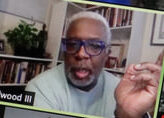 Sam Fulwood III (pictured, by Sharon Farmer), a veteran journalist who has most recently been a public policy analyst for the Washington-based Center for American Progress, has been named dean of the American University School of Communication, the university announced Monday.
Sam Fulwood III (pictured, by Sharon Farmer), a veteran journalist who has most recently been a public policy analyst for the Washington-based Center for American Progress, has been named dean of the American University School of Communication, the university announced Monday.
He will be one of about nine African American journalism deans, directors and department chairs in charge of accredited journalism and communications programs at predominantly white institutions, according to Patricia Thompson, executive director of the Accrediting Council on Education in Journalism and Mass Communications.
“The opportunity to lead a prestigious School of Communication is beyond my imagined fantasy, but I’m completely engaged for the task,” Fulwood messaged Journal-isms. “All of my professional work to date has been to expand the role of journalism and public communication in American society, and to embrace the voices and aspirations of all Americans, especially African-Americans and other marginalized peoples who have been historically erased or absent from our mutual history.
“It’s a particularly poignant moment because my long-standing concerns are now a matter of public reckoning. I think how we tell the story of what’s going on will be crucial to how future generations embrace and protect democracy — or not. Information is critical to participatory democracy, whether that information is delivered by declining traditional media or in emerging, new forms that aren’t yet fully understood or envisioned.
“Regardless, young people will have a major part in the who, what, where, why and how all of us learn about each other. As the dean of American University’s School of Communication I’m excited to play a leading role in shaping the education of and expanding the diverse pool of young people who will create the narrative of our society as it evolves.”
The university announcement said, “During his time as a journalist, he was the metro columnist at Cleveland’s The Plain Dealer and a national correspondent in the Washington, D.C. bureau of the Los Angeles Times, where he contributed to the Pulitzer Prize-winning coverage of the 1992 Los Angeles riots.
“Earlier in his career, Fulwood held the positions of business editor and state political editor for The [Atlanta] Journal-Constitution and worked as an assistant city editor, business reporter, editorial writer, and the Johannesburg, South Africa bureau correspondent for the Baltimore Sun. He began his reporting career at The Charlotte Observer, his hometown daily, where he was a police, sports, and business reporter. . . .”
The School of Communication has 872 undergraduate students, 343 graduate students and 58 full-time faculty, according to its website.
Fulwood, 64, is the author of “Waking from the Dream: My Life in the Black Middle Class,” published in 1996. Fulwood, “child of the post-civil rights generation black bourgeoisie, fluidly recounts his reluctant journey to a ”self-protective buppie cocoon,‘ ” Publishers Weekly wrote at the time.
Manny Garcia to Edit Austin American-Statesman
 “Longtime Austin journalist John Bridges announced his retirement as American-Statesman executive editor Friday, and the news organization named a respected industry leader to succeed him,” the newspaper reported Friday.
“Longtime Austin journalist John Bridges announced his retirement as American-Statesman executive editor Friday, and the news organization named a respected industry leader to succeed him,” the newspaper reported Friday.
“Manny García (pictured), who currently leads ProPublica’s Austin-based investigative partnership with the Texas Tribune, will become the Statesman’s editor and vice president next month. García previously served as standards editor and East Region executive editor for the USA TODAY Network, which now includes the American-Statesman and seven other Texas daily newspapers.
” ‘It’s an honor to be given the opportunity to lead the Austin American-Statesman as it turns 150 years old,’ García said. ‘I’m being handed the keys to a wonderful franchise, with a terrific team and I can’t wait for us to begin this journey together.’ . . .”
In 2018, Garcia won the Robert G. McGruder Award for Diversity Leadership from the Associated Press Media Editors and the American Society of News Editors, which have now merged as the News Leaders Association.
He said then of McGruder, the late executive editor of the Detroit Free Press, “Robert G. McGruder is not here today, but he’s handed me, handed us, a mandate. We live in a time of no excuses. The era of the predictable hire is over. There is a large pool of diverse and talented journalists – at all levels, from college students to rising leaders — waiting for an opportunity. Let’s celebrate Bob’s life, and honor his legacy, and lift others onto our shoulders.”
The Statesman is owned by the Gannett Co. Gannett said in August it planned to increase by 30% the share of BIPOC (Black, Indigenous, people of color) in leadership positions.
Ray Rivera Named Top Editor at Oklahoman
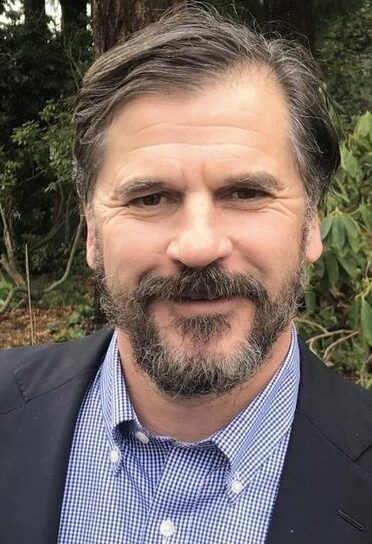 “The Oklahoman named Ray Rivera (pictured) as its executive editor Thursday,” the Gannett-owned news organization announced Friday.
“The Oklahoman named Ray Rivera (pictured) as its executive editor Thursday,” the Gannett-owned news organization announced Friday.
“Rivera, a veteran journalist who has spent his career exposing injustices and holding the powerful accountable, will also serve as the regional editor for the USA TODAY Network’s Sunbelt region, which includes Texas, Oklahoma, Colorado and New Mexico.
“The announcement was made Thursday afternoon, and Rivera was introduced to the staff during a remote meeting. He is leaving his position as managing editor for the Seattle Times to move to Oklahoma City.
“ ‘I’m thrilled to return to a region I’m passionate about,’ Rivera said. ‘Local news is more important than ever, and I am immensely proud to join the hundreds of journalists across Oklahoma, Texas, New Mexico and Colorado who are committed to giving readers what they need to know to navigate their lives, educate their children and hold the powerful accountable.’
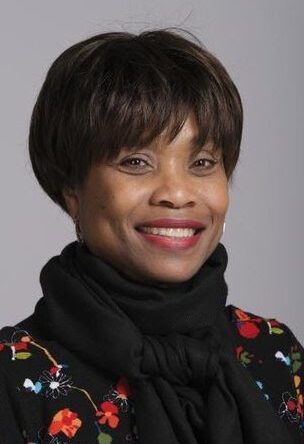 “Rivera joins a team at The Oklahoman focused on digital transformation, reaching underserved readers and reporting on such critical issues as COVID-19 in the state. Among The Oklahoman leaders is Clytie Bunyan (pictured), who is currently serving as the interim editor. . . .”
“Rivera joins a team at The Oklahoman focused on digital transformation, reaching underserved readers and reporting on such critical issues as COVID-19 in the state. Among The Oklahoman leaders is Clytie Bunyan (pictured), who is currently serving as the interim editor. . . .”
Three weeks ago, Bunyan was named interim editor.
She had been director of diversity and engagement. Neither Bunyan nor Kelly Fry, who is retiring as editor and publisher of The Oklahoman, responded to an inquiry about what Bunyan’s role would be.
Rivera was born in El Paso, Texas, and grew up in Raton, New Mexico, just across the border from Colorado.
Gannett said in August it planned to increase by 30% the share of BIPOC (Black, Indigenous, people of color) in leadership positions.

In 2019, Albor Ruiz published “Por Si Muero Mañana,” poetry that sprang from his deep love and commitment to Cuba.
Albor Ruiz, Cuban-American Columnist, Dies at 80
“Renowned journalist Albor Ruiz, a columnist for both the Daily News and El Diario during a long and storied career, died Friday at a Florida hospital,” Larry McShane reported Saturday for the Daily News in New York. “He was 80.”
“The Cuban-born Ruiz passed away at Homestead Hospital less than two months after his November birthday, according to a Facebook announcement. The 2003 inductee of the National Association of Hispanic Journalists’ Hall of Fame was writing almost to the end, with recent columns for the publication Al Dia appearing in print and online as Ruiz continued with his lifelong commitment to providing a voice for the voiceless.”
McShane also wrote, “Ruiz, who served as a mentor to many young journalists during his lengthy career, wrote for both Spanish and English language publications and arrived in New York City in 1980. He was the editor-in-chief at the bilingual newspaper El Daily News and a columnist/chief editorial writer at El Diario-La Prensa before joining the Daily News in 1993 to focus on immigration and Latino issues. . . .
“Ruiz was initially laid off by the News in 2013, brought back to write his column on a freelance basis, and then let go a second time in 2016. He quickly landed at Al Dia, where his career continued until his death.
“Ruiz was born in Cardenas, Cuba, coming to the United States by boat after leaving his homeland under cover of darkness in 1961. He attended the University of Florida before launching his career in journalism, eventually serving as a member of the National Board of the Hispanic journalists’ group.”
NAHJ said in a statement, “Albor Ruiz was proud of his Cuban heritage and consistently utilized his voice to defend his home. He expressed his love and commitment for his home in the exquisite book of poems, “Por si muero mañana.”
As reported in this space in 2013, “When he returned from a trip to Cuba in 2006, Ruiz told Journal-isms he had a Cuban passport, ‘as all Cubans do.’ Cuban immigration authorities held him for two hours at the airport in Havana, but they allowed him to enter ‘because I have family in Cuba. I would not be granted a permit to work as a journalist,’ he said. Nevertheless, Ruiz said he went to work anyway and interviewed a dissident.”
- Abigail Brewer, thedailyguardian.net: The death of the Cuban writer and journalist Albor Ruiz – Juventud Rebelde
- Álvaro Fernández, Progreso Weekly: Progreso loses another great friend, Albor Ruiz, in the span of less than 24 hours
Shawna Thomas Named EP of ‘CBS This Morning’
 “Award-winning journalist, producer and program executive Shawna Thomas (pictured) has been named executive producer for CBS News’ CBS THIS MORNING,” CBS announced Monday. “Thomas will begin her new assignment at CBS News’ flagship morning news broadcast with co-hosts Gayle King, Anthony Mason and Tony Dokoupil on Feb. 1.
“Award-winning journalist, producer and program executive Shawna Thomas (pictured) has been named executive producer for CBS News’ CBS THIS MORNING,” CBS announced Monday. “Thomas will begin her new assignment at CBS News’ flagship morning news broadcast with co-hosts Gayle King, Anthony Mason and Tony Dokoupil on Feb. 1.
” ‘Shawna Thomas is one of the top news minds in our field,” said Susan Zirinsky, president and senior executive producer of CBS News. ‘She’s a hands-on storyteller, accomplished journalist and an inspiring leader. Shawna has consistently embraced new ways and platforms to deliver high-quality journalism to audiences everywhere. She has the passion and experience to take CBS THIS MORNING to the next level during these transformational times.’
The news release added, “She joins CBS News from Quibi, where she served as a content development executive working on short-form news programming from CBS News, NBC News and BBC News for the mobile video platform.
“Before Quibi, Thomas spent three years at Vice News as the Washington, D.C. bureau chief, overseeing politics and policy coverage for HBO’s nightly newscast ‘Vice News Tonight.’ . . .”

Blavity founders, from left: Aaron Samuels, Morgan DeBaun, Jon Jackson and Jeff Nelson
Advertisers Boost Spending on Black Media
“In 2020, a flurry of brands took to social media to share their support of the Black Lives Matter movement. Then, needing to walk the walk, some of those brands started spending more of their media budgets on Black-focused media brands in shows of support — and to build brand affinity with those publications’ audiences,” Kayleigh Barber reported Friday for Digiday.
“Fast forward seven months after the killing of George Floyd and publishers with Black-focused brands and audiences, including Blavity Inc., G/O Media and NBC, are seeing a continued interest, if not an increase in interest, in advertising deals from both new and legacy sponsors.
“And with that revenue lift, comes further investment in covering Black communities and supporting the journalists who are telling those stories.
“Blavity Inc., a digital publisher for millennial and Gen-Z communities of color that owns Blavity, AfroTech, 21Ninety, Travel Noire and Shadow & Act, saw its business grow 50% year over year — an ongoing pattern of growth from when it was first founded in 2014, according to CEO Morgan DeBaun, who declined to discuss revenue growth specifics. . . .”
Barber also wrote, “Like Blavity, NBC’s NBCBLK vertical and G/O Media’s The Root are not new to covering traditionally marginalized communities. NBC built out its BLK vertical in 2015 along with its other diversity verticals: Latino, Out and Asian America. The Root was first created in 2008 by Henry Louis Gates Jr. and Donald E. Graham and was later sold to its current owner G/O Media in 2019.
“Both of the brands are receiving additional support from their owners to continue growing their journalistic coverage in 2021. . . .”

3 Magazines Aimed at People of Color Launched
At least three new magazines targeting people of color were launched in 2020, a year in which the number of new print magazines launched in the United States dropped by more than half to 60, compared with 139 in 2019.
“But in a surprise move, the pace of new launches accelerated in the second half of the year with food, home and fitness titles proving the most popular,” Keith J. Kelly reported Dec. 29 for the New York Post.
“The data comes from Professor Samir Husni, founder of the University of Mississippi’s Magazine Innovation Center at the School of Journalism and New Media, who bills himself as ‘Mr. Magazine,’ and has been tracking the number of new US magazine launches since 1978.”
Husni told Journal-isms Friday of three new magazines aimed at people of color:
- Sweet July, a quarterly lifestyle publication launched in April by the Meredith Corp. It is the brainchild of Ayesha Curry. “She currently helms a restaurant franchise, cookbook and wine label, as well as cookware and bedding brands that together have generated more than $25 million,” Brianne Garrett reported on June 19 for Forbes. “And while she’s not starring in major motion pictures to earn her a Walk of Fame spot, she has graced television screens on the Food Network and as a Cover Girl.”
- She’s Single Magazine, owned and founded by Lisa K Stephenson, who was planning a book on the topic. “The message I want to convey to my audience is that we have to be strong instead of pretending to be strong,” Stephenson told Gaurav Gulati for aboutinsider.com in May. “You can walk into a Lion’s den, the den is open, but do you have to be fearful of the lions there? No. As women when we’re single or dating we like to pretend a lot, thinking that if we say all the right things the man we like will like us back or if we pretend to be stoic after sex the boy will come chasing. But all in all we are doing ourselves a disservice. . . .”
- Justsmile, from stylist Kevin Hunter and photographer Bryce Thomas, now based in Sydney, Australia. “The pair conceived of a print magazine that would spotlight the work of Black creatives and people of color working within the worlds of fashion, art, and music,” Liam Hess wrote Dec. 9 for Vogue magazine. “While the magazine doesn’t shy away from politics and activism, the pair’s intention was also to create a much-needed space for Black joy. . . .”
As previously reported, “Blackness exploded on the covers of magazines during the middle months of 2020,” Husni wrote Nov. 20 for the Poynter Institute.
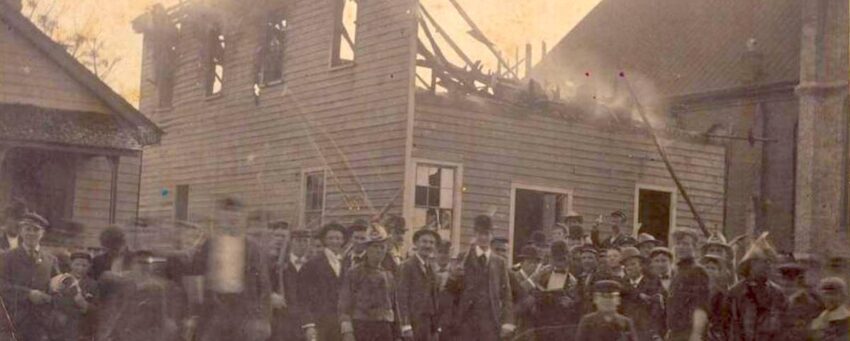
Grove Press published an excerpt of reporter David Zucchino’s account of the Wilmington.N.C., insurrection under the headline, “By Bullet or Ballot: One of the Only Successful Coups in American History.“
Should Washington Post Join in Mea Culpas?
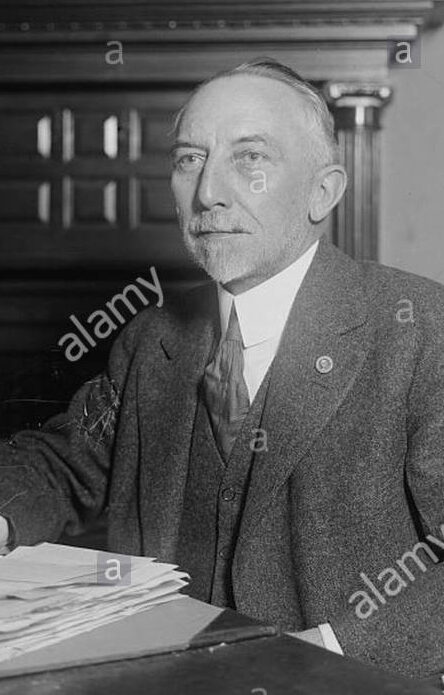 In reaching for analogies to the insurrection at the U.S. Capitol on Wednesday, MSNBC host Chris Hayes recalled the riot that took place in 1898 in Wilmington, N.C., in which a white coup d’etat replaced the city’s duly elected officeholders with white supremacists.
In reaching for analogies to the insurrection at the U.S. Capitol on Wednesday, MSNBC host Chris Hayes recalled the riot that took place in 1898 in Wilmington, N.C., in which a white coup d’etat replaced the city’s duly elected officeholders with white supremacists.
The violence killed “an unknown number of blacks,” as the Wilmington Race Riot Commission explained in a post-mortem 10 years ago.
As this column reported then, LeRae Umfleet, a state researcher who wrote the report, cited The Washington Post in discussing out-of-state reporters who played a role in inciting the violence. Henry Litchfield West (pictured above), a Post reporter, rode in parades of the Red Shirts, a militant wing of the pro-white Democratic Party. “He was sympathetic to the white supremacist movement and his stories in the Post reflected that,” she said.
Because of the slant of West’s reports, the federal government “was less likely to send federal assistance to the city,” Umfleet said. “If the people of Wilmington knew that the federal government would take action, things in Wilmington wouldn’t have progressed as they did. I don’t think any black deaths would have occurred.” The white supremacists “orchestrated this all the way to Washington, D.C.”
In light of recent mea culpas by such newspapers as the Kansas City Star and the Los Angeles Times for their past racism, Journal-isms asked the Post last month whether it planned to do the same. Kris Coratti, the Post’s vice president, communications, has not responded.
Grove Press published an excerpt of reporter David Zucchino’s account of the Wilmington developments this week under the headline, “By Bullet or Ballot: One of the Only Successful Coups in American History.“
Paul McGrath, a former Irish soccer superstar, was born in London. With an Irish mother and a Nigerian father, McGrath spent the first 16 years of his life in an orphanage. (video: Birmingham Live)
Ireland to Apologize for Deadly Orphanages
“In the middle of the last century, thousands of students from African countries were studying at Irish universities,“ Deirdre Finnerty reported last month for BBC News. “Some had children outside marriage, who were then placed in one of Ireland’s notorious mother and baby homes. Today these children, now adults, are searching for their families.”
The Sunday Independent in Dublin reported Sunday that it had learned that a government commission will report this week that a “most disquieting 9,000 children died in the just 18 institutions investigated.” The head of state, Micheál Martin, plans to make a formal state apology to survivors on Wednesday, the Irish Times reported.
 Fergus Shiel (pictured, by Sharon Farmer), managing editor of the Washington-based International Consortium of Investigative Journalists, spent time in one of the mother and baby homes.
Fergus Shiel (pictured, by Sharon Farmer), managing editor of the Washington-based International Consortium of Investigative Journalists, spent time in one of the mother and baby homes.
“When I was a kid in Dublin, there were very few African Irish and racism was pervasive but an oddly Irish racism, which was verbally awful but disconcertingly far less venomous and less political than what I have seen elsewhere,” Shiel messaged Journal-isms. “It was a bizarre brand of naive, occasionally inclusive, racism. No less shocking, or painful for those on the end of it, but odd.
“The most famous black Irishman was Phil Lynott of Thin Lizzy fame. And Paul McGrath, an Irish soccer superstar, followed in his wake. Both were geniuses, both suffered great personal pain because of racism and both had serious substance abuse issues (like so many of my countrymen and women). “McGrath was raised in various tough orphanages throughout Dublin, the grim photos of which can still be seen today,” the Bleacher Report told readers in 2009.
Shiel continued, “Like them, I bounced around in ‘mother and child’ homes, too. I was born in the east end of London, then bounced from orphanage to orphanage back to Dublin. Ireland has treated its adoptees with singular cruelty – and adoptees of color were even further down the pecking order. The cruelty was not just endured by the children but also their mothers. The mothers suffered terribly.
“Like Conrad in the [BBC] story, I was born in 1964. And like him, I was in the infamous St Patrick’s home, where undocumented babies were sold to the US and some didn’t make it out at all. Like him, too, I was stalled for decades by church and state from finding out about my background. Unfortunately, in my case, the stalling has yet to relent.
“Happily, there are now many Irish Africans — including in my family — and whilst racism remains a serious problem, it is much less accepted. Irish Africans and Caribbeans are now prominent in sport, music, fashion and other fields. It is fantastic to see.”
Short Takes
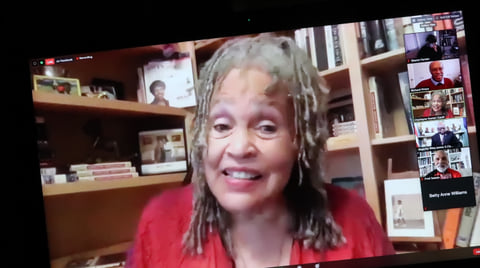 In an op-ed piece Saturday in the New York Times, Charlayne Hunter-Gault (pictured, by Sharon Farmer), reflected on the desegregation of the University of Georgia 60 years ago by Hamilton Holmes and herself. She recalled that her journalism professor said on the first day of class, “We learn from history that we do not learn from history,” and added, “In my five decades as a journalist bearing witness to the cyclical nature of our country’s history of racism and division, I’ve come to believe that my professor’s sentiment was his way of challenging us to not only learn from our history, but also to use our craft as journalists to help the public know our past, because the duty to remember does not belong to journalists alone. It’s only through this knowledge that we’re all able to make informed decisions about our lives — decisions that, in turn, affect our neighbors near and far.”
In an op-ed piece Saturday in the New York Times, Charlayne Hunter-Gault (pictured, by Sharon Farmer), reflected on the desegregation of the University of Georgia 60 years ago by Hamilton Holmes and herself. She recalled that her journalism professor said on the first day of class, “We learn from history that we do not learn from history,” and added, “In my five decades as a journalist bearing witness to the cyclical nature of our country’s history of racism and division, I’ve come to believe that my professor’s sentiment was his way of challenging us to not only learn from our history, but also to use our craft as journalists to help the public know our past, because the duty to remember does not belong to journalists alone. It’s only through this knowledge that we’re all able to make informed decisions about our lives — decisions that, in turn, affect our neighbors near and far.”
-
 Jon Funabiki (pictured) has retired from Renassiance Journalism, the San Francisco-based organization he founded in 2009, and on Jan. 1 was succeeded by his deputy, Valerie Bush (pictured).
Jon Funabiki (pictured) has retired from Renassiance Journalism, the San Francisco-based organization he founded in 2009, and on Jan. 1 was succeeded by his deputy, Valerie Bush (pictured).  Funabiki is a professor of journalism at San Francisco State University. He founded Renaissance Journalism at “a time when virtually all traditional news organizations were struggling to survive a battering ram of change sparked by new digital technologies and business models. In the face of crisis, Renaissance Journalism encouraged journalists to innovate, to seek wisdom from the communities they cover, and to zero in on systemic inequities, social justice issues, and amplifying the voices and stories of marginalized people. . . .”
Funabiki is a professor of journalism at San Francisco State University. He founded Renaissance Journalism at “a time when virtually all traditional news organizations were struggling to survive a battering ram of change sparked by new digital technologies and business models. In the face of crisis, Renaissance Journalism encouraged journalists to innovate, to seek wisdom from the communities they cover, and to zero in on systemic inequities, social justice issues, and amplifying the voices and stories of marginalized people. . . .”
 Abby Phillip (pictured) will become the anchor of “Inside Politics Sunday with Abby Phillip” and Jim Acosta has been named anchor and chief domestic correspondent for CNN, the network announced Monday. In a series of reassignments, Phillip’s show is to air from 8-9 a.m. ET on Sundays, beginning Jan. 24. She has also been named the network’s senior political correspondent. Acosta’s anchoring duties will be on the weekends with more details coming soon, the network said. Phillip was the subject of a lengthy post-election feature Nov.13 in the New York Times headlined, “Abby Phillip Is Next-Gen CNN.”
Abby Phillip (pictured) will become the anchor of “Inside Politics Sunday with Abby Phillip” and Jim Acosta has been named anchor and chief domestic correspondent for CNN, the network announced Monday. In a series of reassignments, Phillip’s show is to air from 8-9 a.m. ET on Sundays, beginning Jan. 24. She has also been named the network’s senior political correspondent. Acosta’s anchoring duties will be on the weekends with more details coming soon, the network said. Phillip was the subject of a lengthy post-election feature Nov.13 in the New York Times headlined, “Abby Phillip Is Next-Gen CNN.”
- “The net worth of White Americans hit a record high last year, driven by a stock-market rebound that defied the pandemic, while other ethnic groups saw their share of the nation’s wealth decline, according to recently released data from the Federal Reserve,” Alex Tanzi reported for Bloomberg News. Tanzi also wrote, “the portion of overall wealth held by Black Americans fell to 3.8% — down from 4.4% two years earlier — while for Hispanic Americans it dropped to 2.1%.
- “As COVID-19 tore through the United States in the spring, a senior official in the Trump administration quietly reinforced a set of guidelines that prevented journalists from getting inside all but a handful of hospitals at the front line of the pandemic,” Peter Maass reported Dec 27 for The Intercept. “The guidelines, citing the medical privacy law known as HIPAA, suggested a nearly impossible standard: Before letting journalists inside Covid-19 wards, hospitals needed prior permission from not only the specific patients the journalists would interview, but also other patients whose names or identities would be accessible.”
- “More than 600 journalists died of Covid-19 in 59 countries in ten months in 2020, that is to say 60 per month, or two per day on average,” the Press Emblem Campaign announced Tuesday in Geneva, LatAm Journalism Review reported Wednesday. “Of the 602 journalists who have died from Covid-19 since March 1, 2020, Latin America leads with more than half of the victims, or 303 deaths. . . . Peru remains the country with the heaviest death toll, with 93 media workers who have died from the coronavirus since March (according to the Peruvian National Association of Journalists).”
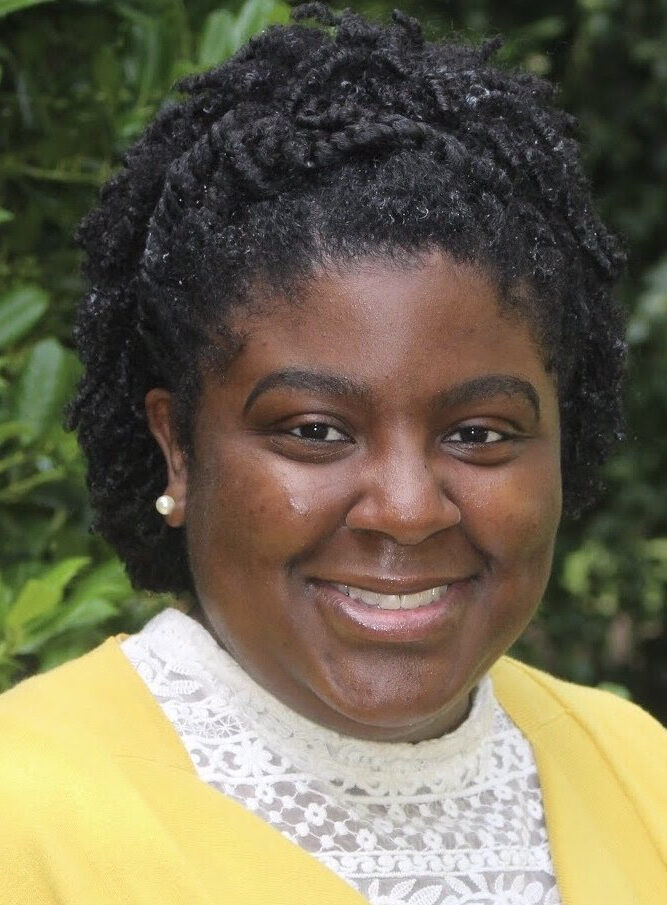 “Whitney Maddox (pictured), a dynamic, creative diversity leader from Georgetown University is NPR’s new Diversity Equity & Inclusion Manager. Whitney will join me in working on DE&I efforts across NPR and with our Member stations,” Keith Woods, who now has the title of chief diversity officer, announced Friday to the NPR staff. Woods said Maddox “emerged from a field of 499 candidates from across the country.”
“Whitney Maddox (pictured), a dynamic, creative diversity leader from Georgetown University is NPR’s new Diversity Equity & Inclusion Manager. Whitney will join me in working on DE&I efforts across NPR and with our Member stations,” Keith Woods, who now has the title of chief diversity officer, announced Friday to the NPR staff. Woods said Maddox “emerged from a field of 499 candidates from across the country.”
- “A 21-year-old Arizona man who pleaded guilty to helping a neo-Nazi group threaten and intimidate journalists was sentenced on Wednesday to 16 months in federal prison,” Azi Paybarah reported for the New York Times Dec. 9. “The man, Johnny Roman Garza of Queen Creek, Ariz., was among a handful of people linked to a violent paramilitary neo-Nazi group, the Atomwaffen Division, who were arrested in February, prosecutors in Virginia and Washington State announced. . . .” Targets of the neo-Nazi group included Miami Herald columnist Leonard Pitts Jr., ProPublica reporter A.C. Thompson and an unnamed member of the Arizona Association of Black Journalists.
 “Kristen Welker (pictured) and Peter Alexander will be our new Chief White House Correspondents, leading our coverage of the incoming Biden Administration,” NBC News President Noah Oppenheim announced to staffers Sunday. “As if co-anchoring Weekend TODAY together wasn’t enough, this duo’s tenacious reporting has been at the heart of our political coverage for the last two administrations and the White House unit could not be in better hands.” In addition, “Andrea Mitchell will add another ‘chief’ to her name, taking on the title of Chief Washington Correspondent in addition to her long-time role covering all things international as our Chief Foreign Affairs Correspondent. . . .Geoff Bennett and Kelly O’Donnell will continue to serve as White House Correspondents.”
“Kristen Welker (pictured) and Peter Alexander will be our new Chief White House Correspondents, leading our coverage of the incoming Biden Administration,” NBC News President Noah Oppenheim announced to staffers Sunday. “As if co-anchoring Weekend TODAY together wasn’t enough, this duo’s tenacious reporting has been at the heart of our political coverage for the last two administrations and the White House unit could not be in better hands.” In addition, “Andrea Mitchell will add another ‘chief’ to her name, taking on the title of Chief Washington Correspondent in addition to her long-time role covering all things international as our Chief Foreign Affairs Correspondent. . . .Geoff Bennett and Kelly O’Donnell will continue to serve as White House Correspondents.”
- “If you work at The Washington Post, congratulations, you’re starting the new year with some extra cash in the bank,” Sean Burch reported Jan. 1 for The Wrap. “That’s because all Washington Post employees are receiving a ‘special bonus’ of $2,021 within the next week, WaPo reporter Jose A. Del Real tweeted on Thursday night. (WaPo reporter Mike Rosen also confirmed the new year’s bonus.) . . .”
- In a Pew Research Center survey taken after the election but before Wednesday’s storming of the Capitol, Latinos and African Americans were feeling dramatically more hopeful and less angry about the country, Suzanne Gamboa reported Dec. 10 for NBC News. “Meanwhile, the share of white Americans who said in the survey that they were angry did not shrink as significantly as among Blacks and Latinos. There also was a smaller increase in the share of white Americans who said they are now hopeful.”
- “In a year that saw the closing of businesses, skyrocketing unemployment and ongoing hate incidents concurrent with the public health crisis, the severity of Asian Americans’ struggles has been minimized at best or gone unnoticed at worst, experts say,” Kimmy Yam reported Dec. 23 for NBC Asian America. “Many trace the invisibility of the community’s challenges, in part, to the mythical characterization of the racial group as compliant, successful and faring well — tropes that have long obscured the reality of their struggles.”
 “Kirkland Crawford (pictured) a Detroit native who has worked at the Detroit Free Press since high school, is the new sports editor of the paper and freep.com,” the Free Press reported Dec. 31. “In his time at the Free Press, Crawford notes, he has been part of teams covering five Tigers playoff runs, five Pistons playoff runs, three NCAA tournament finals, one Stanley Cup championship, six Olympics, several scandals, dozens of coach/GM hirings and firings, three owner deaths and the demise of Mr. Hockey, Mr. Tiger and Ernie and … zero Lions playoff wins.” The latest Associated Press Sports Editors Racial and Gender Report Card, in 2018, showed that “85 percent of the sports editors, 77 percent of the assistant sports editors, 80 percent of the columnists, 82 percent of the reporters and 78 percent of the copy editors/designers were white.”
“Kirkland Crawford (pictured) a Detroit native who has worked at the Detroit Free Press since high school, is the new sports editor of the paper and freep.com,” the Free Press reported Dec. 31. “In his time at the Free Press, Crawford notes, he has been part of teams covering five Tigers playoff runs, five Pistons playoff runs, three NCAA tournament finals, one Stanley Cup championship, six Olympics, several scandals, dozens of coach/GM hirings and firings, three owner deaths and the demise of Mr. Hockey, Mr. Tiger and Ernie and … zero Lions playoff wins.” The latest Associated Press Sports Editors Racial and Gender Report Card, in 2018, showed that “85 percent of the sports editors, 77 percent of the assistant sports editors, 80 percent of the columnists, 82 percent of the reporters and 78 percent of the copy editors/designers were white.”
- “
 Apple today announced that Monica Lozano (pictured), president and CEO of College Futures Foundation, has been elected to the company’s board of directors,” MacRumors reported Wednesday. It also said, “Prior to joining College Futures Foundation, Lozano spent 30 years in media as editor and publisher of La Opinión, the largest Spanish-language newspaper in the United States, according to Apple. Lozano continues to serve on the boards of Target and Bank of America, and is also a former board member of The Walt Disney Company.”
Apple today announced that Monica Lozano (pictured), president and CEO of College Futures Foundation, has been elected to the company’s board of directors,” MacRumors reported Wednesday. It also said, “Prior to joining College Futures Foundation, Lozano spent 30 years in media as editor and publisher of La Opinión, the largest Spanish-language newspaper in the United States, according to Apple. Lozano continues to serve on the boards of Target and Bank of America, and is also a former board member of The Walt Disney Company.”
- The National Association of Hispanic Journalists (NAHJ) is pleased to announce the creation of a new scholarship in partnership with the White House Correspondents’ Association, NAHJ announced Dec. 17. “The NAHJ-WHCA Scholarship will be awarded each year to a student with a demonstrated interest in a career in journalism and proven academic performance. The student must be aware of the issues facing the Latino community and Latinos in the newsroom while also striving to portray all people in a fair and accurate manner in the coverage of stories. . . . The scholarship will be for $2,000 each year, with the NAHJ contributing half and the WHCA contributing half.”
- Brent Jones, editor of culture, training and outreach for The Wall Street Journal and former head of standards and ethics at USA Today, has joined the board of the Freedom Forum, the foundation announced Dec. 10.
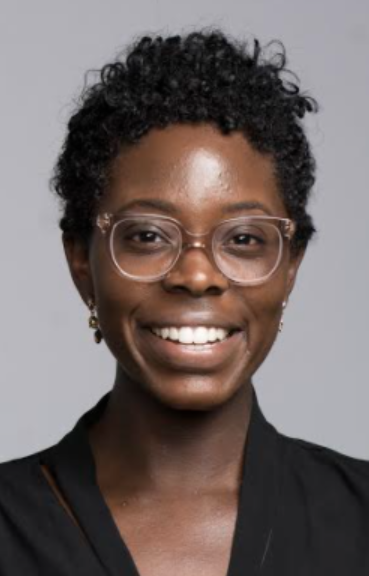 Nia Decaille (pictured) joins us from The Washington Post, where she was an SEO adviser and an audience editor in the Business section. She will start in January as a SEO editor and become the newest member of the growing SEO team at The Times,” The New York Times wrote on Dec. 22. “In her role at The Post, Nia wrote about a wide range of topics, including Black motherhood in hip-hop and how the beauty world faces a pandemic, as well as helped lead on SEO efforts across the newsroom. Before joining The Post, she worked as a freelance writer for publications such as Bustle, Vice and The Root, among others. Nia also worked as a senior content strategist for the New York City start-up Odyssey, where she built online communities of collegiate writers. . . .”
Nia Decaille (pictured) joins us from The Washington Post, where she was an SEO adviser and an audience editor in the Business section. She will start in January as a SEO editor and become the newest member of the growing SEO team at The Times,” The New York Times wrote on Dec. 22. “In her role at The Post, Nia wrote about a wide range of topics, including Black motherhood in hip-hop and how the beauty world faces a pandemic, as well as helped lead on SEO efforts across the newsroom. Before joining The Post, she worked as a freelance writer for publications such as Bustle, Vice and The Root, among others. Nia also worked as a senior content strategist for the New York City start-up Odyssey, where she built online communities of collegiate writers. . . .”
- Ugandan security forces should stop harassing and attacking journalists, and should ensure that the press can freely cover the country’s upcoming elections,” the Committee to Protect Journalists said Thursday. “Since December 11, security officers have assaulted at least 10 journalists covering opposition events ahead of the country’s January 14 presidential election, and briefly detained at least two members of the press and questioned them about their work, according to media reports and journalists who spoke with CPJ.”
- “Journalists in Uganda on Monday stormed out of a security meeting with the army and Police citing brutality from the security forces and unprovoked attacks on the fourth estate,” Amina Wako reported Dec. 29 for Nairobi News in Kenya. “The journalists demanded to know why journalists following NUP Presidential candidate Robert Kyagulanyi aka Bobi Wine are being brutalized and beaten up while those covering incumbent Yoweri Museveni’s political campaigns appeared to do their work without any challenges. . . .”
- “Colombian authorities must thoroughly investigate the killing of journalist Andrés Felipe Guevara Henao, determine if he was targeted for his work, and bring those responsible to justice,” the Committee to Protect Journalists said Friday. “On December 21, 2020, in the western city of Cali, an unidentified assailant shot Guevara four times while he was talking with a friend in front of his home, according to news reports.”
- In Honduras, Reporteros de Investigación (Investigative Reporters) is releasing short films that talk “about how there are elites that are in collusion with organized crime in the country to murder journalists and important actors in the country.” The documentary “Élites Criminales” (“Criminal Elites”) is “now available on YouTube. The project is part of a longer-term one to make short films that reflect the danger journalists face in Honduras,” Silvia Higuera reported Dec. 9 for LatAm Journalism Review.
To subscribe at no cost, please send an email to journal-isms+subscribe@groups.io and say who you are.
Facebook users: “Like” “Richard Prince’s Journal-isms” on Facebook.
Follow Richard Prince on Twitter @princeeditor
Richard Prince’s Journal-isms originates from Washington. It began in print before most of us knew what the internet was, and it would like to be referred to as a “column.” Any views expressed in the column are those of the person or organization quoted and not those of any other entity. Send tips, comments and concerns to Richard Prince at journal-isms+owner@
View previous columns (after Feb. 13, 2016).
View previous columns (before Feb. 13, 2016)
- Diversity’s Greatest Hits, 2018 (Jan. 4, 2019)
- Book Notes: Is Taking a Knee Really All That? (Dec. 20, 2018)
- Book Notes: Challenging ’45’ and Proudly Telling the Story (Dec. 18, 2018)
- Book Notes: Get Down With the Legends! (Dec. 11, 2018)
- Journalist Richard Prince w/Joe Madison (Sirius XM, April 18, 2018) (podcast)
- Richard Prince (journalist) (Wikipedia entry)
- February 2018 Podcast: Richard “Dick” Prince on the need for newsroom diversity (Gabriel Greschler, Student Press Law Center, Feb. 26, 2018)
- Diversity’s Greatest Hits, 2017 — Where Will They Take Us in the Year Ahead?
- Book Notes: Best Sellers, Uncovered Treasures, Overlooked History (Dec. 19, 2017)
- An advocate for diversity in the media is still pressing for representation, (Courtland Milloy, Washington Post, Nov. 28, 2017)
- Morgan Global Journalism Review: Journal-isms Journeys On (Aug. 31, 2017)
- Diversity’s Greatest Hits, 2016
- Book Notes: 16 Writers Dish About ‘Chelle,’ the First Lady
- Book Notes: From Coretta to Barack, and in Search of the Godfather
- Journal-isms’ Richard Prince Wants Your Ideas (FishbowlDC, Feb. 26, 2016)
- “JOURNAL-ISMS” IS LATEST TO BEAR BRUNT OF INDUSTRY’S ECONOMIC WOES (Feb. 19, 2016)
- Richard Prince with Charlayne Hunter-Gault,“PBS NewsHour,” “What stagnant diversity means for America’s newsrooms” (Dec. 15, 2015)
- Book Notes: Journalists Follow Their Passions
- Book Notes: Journalists Who Rocked Their World
- Book Notes: Hands Up! Read This!
- Book Notes: New Cosby Bio Looks Like a Best-Seller
- Journo-diversity advocate turns attention to Ezra Klein project (Erik Wemple, Washington Post, March 5, 2014)

